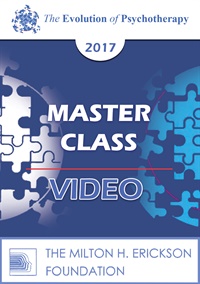Credit available - Click Here for more information
- Average Rating:
- Not yet rated
- Topic Areas:
- Master Classes | Experiential Therapy | Gestalt | Hypnosis | Psychotherapy
- Bundle(s):
- EP17 Video Stream Build a Bundle
- Categories:
- Evolution of Psychotherapy | Evolution of Psychotherapy 2017 | Online Continuing Education
- Faculty:
- Jeffrey Zeig, PhD | Erving Polster, PhD
- Course Levels:
- Master Degree or Higher in Health-Related Field
- Duration:
- 2:33:42
- Format:
- Audio and Video
- Original Program Date:
- Dec 18, 2017
- Short Description:
- Part 3 of 3. Gestalt therapy and Ericksonian hypnotherapy are experiential methods of change. In combination they can be synergistic. Psychotherapy is best when clients have a first-hand experience of an alive therapeutic process. Such dynamic empowering experiences pave the way for dynamic understandings. Drs. Polster and Zeig will engage with each other and the participants to examine commonalities and differences in their work.
- Price:
-
Sale is $29.00
price reduced from Base Price - $59.00
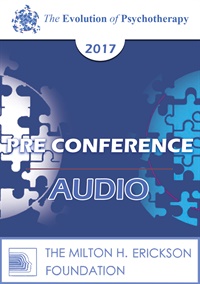
- Average Rating:
- Not yet rated
- Topic Areas:
- Hypnosis | Suggestion | Pre-Conference Sessions | Hypnotic Phenomena | Psychotherapy
- Bundle(s):
- EP17 Audio Streaming Build a Bundle
- Categories:
- Evolution of Psychotherapy | Evolution of Psychotherapy 2017
- Faculty:
- Michael Yapko, PhD
- Duration:
- 2:40:42
- Format:
- Audio Only
- Original Program Date:
- Dec 12, 2017
- Short Description:
- Building on the pragmatic foundation you have already developed as a clinician, you can readily appreciate that suggestion is an inevitable part of any treatment modality. The study of clinical hypnosis encourages a deeper understanding of how you already use suggestive language in your therapy approaches as well as ways to broaden your range of skills in suggesting therapeutic possibilities. Immersion in the practice of clinical hypnosis fosters sensitivity to the unique and subjective aspects of human experience and offers ways to enlist these potentials as positive allies in treatment. In this respect, hypnosis may well be regarded as the original applied “Positive Psychology,” for anyone who practices hypnosis recognizes that people have many more resources than they realize.
- Price:
- $15.00 - Base Price
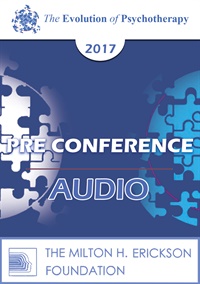
- Average Rating:
- Not yet rated
- Topic Areas:
- Hypnosis | Hypnotic Phenomena | Pre-Conference Sessions | Suggestion | Psychotherapy
- Bundle(s):
- EP17 Audio Streaming Build a Bundle
- Categories:
- Evolution of Psychotherapy | Evolution of Psychotherapy 2017
- Faculty:
- Michael Yapko, PhD
- Duration:
- 1:11:13
- Format:
- Audio Only
- Original Program Date:
- Dec 12, 2017
- Short Description:
- Building on the pragmatic foundation you have already developed as a clinician, you can readily appreciate that suggestion is an inevitable part of any treatment modality. The study of clinical hypnosis encourages a deeper under- standing of how you already use suggestive language in your therapy approaches as well as ways to broaden your range of skills in suggesting therapeutic possibilities. Immersion in the practice of clinical hypnosis fosters sensitivity to the unique and subjective aspects of human experience and offers ways to enlist these potentials as positive allies in treatment. In this respect, hypnosis may well be regarded as the original applied “Positive Psychology,” for anyone who practices hypnosis recognizes that people have many more resources than they realize. Hypnosis allows innate resources we all have to be far mor
- Price:
- $15.00 - Base Price
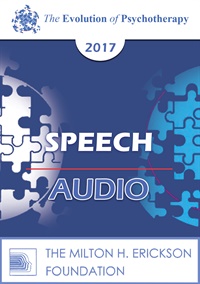
- Average Rating:
- Not yet rated
- Topic Areas:
- Speeches | Multicultural | Psychotherapy
- Bundle(s):
- EP17 Audio Streaming Build a Bundle
- Categories:
- Evolution of Psychotherapy | Evolution of Psychotherapy 2017
- Faculty:
- Patricia Arredondo, EdD
- Duration:
- 1:28:36
- Format:
- Audio Only
- Original Program Date:
- Dec 14, 2017
- Short Description:
- The application of culturally-informed practices taking into account socio-cultural and historical contexts and intersecting identity factors is essential to ethical practice. In this presentation cultural-centered frameworks are reviewed as tools to recognize unconscious biases and to enhance respectful and inclusive engagements with individuals, groups, and communities. This presentation is informed by the APA Multicultural Guidelines and the Multicultural Counseling Competencies (Sue, Arredondo & McDavis, 1992). Examples from clinical and organizational practice will be introduced.
- Price:
- $15.00 - Base Price
Tags: Multi-Cultural Psychotherapy
Credit available - Click Here for more information
- Average Rating:
- Not yet rated
- Topic Areas:
- Speeches | Attachment | Psychotherapy | Couples Therapy | Family Therapy
- Bundle(s):
- EP17 Video Stream Build a Bundle
- Categories:
- Evolution of Psychotherapy | Evolution of Psychotherapy 2017 | Online Continuing Education
- Faculty:
- Sue Johnson, EdD
- Course Levels:
- Master Degree or Higher in Health-Related Field
- Duration:
- 41:22
- Format:
- Audio and Video
- Original Program Date:
- Dec 15, 2017
- Short Description:
- A coherent science on attachment now offers therapists a map for self and relational system that cogently outlines both dysfunction and health – and how to lead clients from one to the other. This presentation will outline the strengths of this integrating framework as a general and specific in-session guide for individual, couple and family therapy, focusing on the map it offers for affect regulation, cognitive restructuring and behavior change.
- Price:
- $0.00 - $29.00
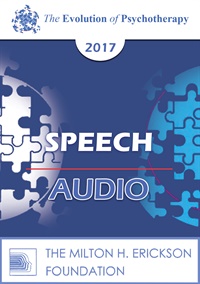
- Average Rating:
- Not yet rated
- Topic Areas:
- Speeches | Multicultural | Gender | LGBTQ | Psychotherapy
- Bundle(s):
- EP17 Audio Streaming Build a Bundle
- Categories:
- Evolution of Psychotherapy | Evolution of Psychotherapy 2017
- Faculty:
- Derald Wing Sue, PhD
- Course Levels:
- Master Degree or Higher in Health-Related Field
- Duration:
- 55:44
- Format:
- Audio Only
- Original Program Date:
- Dec 15, 2017
- Short Description:
- Racial, gender, and LGBTQ micro aggressions are brief and commonplace daily verbal, behavioral or environmental indignities which communicate hostile, derogatory, or negative slights to targets. They are often reflections of implicit bias that are outside the level of conscious awareness of well-intentioned individuals. Nevertheless, they have been found to cause lowered subjective well-being in the lives of marginalized group members and may lead to mental health problems. Research indicates that clinicians and supervisors are often perpetrators of micro aggressions.
- Price:
- $15.00 - Base Price
Credit available - Click Here for more information
- Average Rating:
- Not yet rated
- Topic Areas:
- Speeches | Meditation, Spirituality and Yoga | Memory | Psychotherapy | Consciousness
- Bundle(s):
- EP17 Video Stream Build a Bundle
- Categories:
- Evolution of Psychotherapy | Evolution of Psychotherapy 2017 | Online Continuing Education
- Faculty:
- Jean Houston, PhD
- Course Levels:
- Master Degree or Higher in Health-Related Field
- Duration:
- 1:00:39
- Format:
- Audio and Video
- Original Program Date:
- Dec 15, 2017
- Short Description:
- The discovery of the quantum nature of our universe is so major an event that its profound implications cannot be overstated. Quantum theory demands a radical re-visioning of the role of Consciousness as the underlying organizing principle of the universe. Working with these concepts, both spiritual and scientific, we have enabled students to be, to do and to create in ways that are suggestive of higher levels of human accomplishment. Similarly from the quantum perspective of the simultaneity of past, present and future we are able to change the story of minor past events until it become a realistic part of one’s memory.
- Price:
-
Sale is $29.00
price reduced from Base Price - $59.00
Credit available - Click Here for more information
- Average Rating:
- Not yet rated
- Topic Areas:
- Speeches | Cognitive Behavior Therapy (CBT) | History of Psychotherapy | Psychotherapy
- Bundle(s):
- Learning Track - EP17 CBT Stream | EP17 Video Stream Build a Bundle
- Categories:
- Evolution of Psychotherapy | Evolution of Psychotherapy 2017 | Evolution of Psychotherapy CBT Learning Track | Online Continuing Education
- Faculty:
- Donald Meichenbaum, PhD
- Course Levels:
- Master Degree or Higher in Health-Related Field
- Duration:
- 1:02:36
- Format:
- Audio and Video
- Original Program Date:
- Dec 15, 2017
- Short Description:
- The presentation will trace the evolution of cognitive behavior therapy, showing the “untold story” and critically evaluate its present status. It will also consider the future intervention of computer technology.
- Price:
-
Sale is $29.00
price reduced from Base Price - $59.00
Credit available - Click Here for more information
- Average Rating:
- Not yet rated
- Topic Areas:
- Speeches | Psychotherapy | Relationships | Therapist Development
- Bundle(s):
- Learning Track - EP17 Psychotherapy Stream | EP17 Video Stream Build a Bundle
- Categories:
- Evolution of Psychotherapy | Evolution of Psychotherapy 2017 | Evolution of Psychotherapy Psychotherapy Learning Track | Online Continuing Education
- Faculty:
- Esther Perel, MA, LMFT
- Course Levels:
- Master Degree or Higher in Health-Related Field
- Duration:
- 53:45
- Format:
- Audio and Video
- Original Program Date:
- Dec 15, 2017
- Short Description:
- In her new Audible original audio series: Where Should We Begin, Esther Perel invites the listener into the raw intimate space of real anonymous couples who are participating in unscripted counseling sessions. In opening the closed doors of psychotherapy, she stands to redefine not only the boundaries of therapy, but also the communal nature of healing. The project raises some timely questions: If one of therapy's aims is to create a space for meaningful, challenging and authentic conversations between partners, can it broaden its aim and address relationships in today’s complex world in general. Can it serve to strengthen and improve human connection in society at large? What does therapy offer that differs from coaching? Where do thought leaders and psychotherapists intersect?
- Price:
-
Sale is $29.00
price reduced from Base Price - $59.00
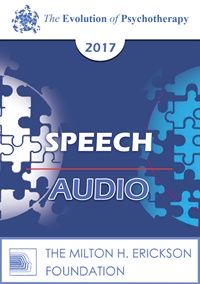
- Average Rating:
- Not yet rated
- Topic Areas:
- Speeches | Utilization | Ericksonian Hypnosis and Therapy Techniques | Hypnosis | Psychotherapy
- Bundle(s):
- Learning Track - EP17 Erickson Download | EP17 Audio Streaming Build a Bundle
- Categories:
- Evolution of Psychotherapy | Evolution of Psychotherapy 2017 | Evolution of Psychotherapy Erickson Learning Track
- Faculty:
- Michael Yapko, PhD
- Duration:
- 1:01:15
- Format:
- Audio Only
- Original Program Date:
- Dec 15, 2017
- Short Description:
- As advances are made in better understanding the power of focus in shaping one’s subjective perceptions and even physiology, the field of hypnosis has played an especially important role in this ongoing process of discovery. Despite too many clinicians’ terribly misinformed dismissal of hypnosis as little more than a gimmick, in fact hypnosis has evolved a strong scientific basis for its insights into neuroscience, cognition, suggestive language and information processing, placebo and nocebo responses, the therapeutic alliance, and more. Some of these insights and their clinical implications will be discussed.
- Price:
- $15.00 - Base Price
Please wait ...


